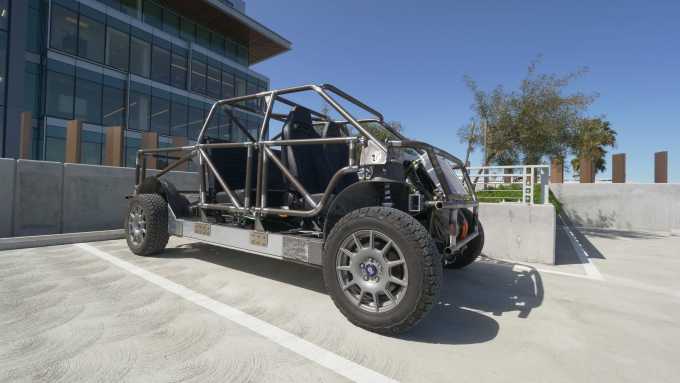Pint-size pickup startup Telo Trucks adds Tesla co-founder to board as interest grows from fleet customers
When electric-vehicle startup Telo Trucks announced its pint-sized pickup, people predictably went nuts. There’s a cadre for whom small trucks aren’t just convenient, they’re a lifestyle, one that major automakers have largely ignored for the last 20 years as they’ve chased high-margin, full-size pickups. With little more than some renders and early prototypes, the company has racked up nearly 3,000 reservations.
But over the last several months, something less expected happened. Fleet customers went nuts, too.
“There’s this unspoken thing where fleet companies that do work in cities can no longer buy small trucks,” Jason Marks, Telo Truck’s co-founder and CEO, told TechCrunch. “They used to love them: They were perfect for these fleet applications for downtown cities, but they don’t exist anymore.”
What some fleet managers have resorted to is buying neighborhood electric vehicles, which are basically souped-up golf carts that can be equipped with a small bed in the back. But because those low-speed vehicles can’t be used on the highway, the fleet also has to buy and maintain a full-size pickup to be able to accomplish everything it needs to do.
“It’s a unique opportunity, because we have this massive hole in the market,” Marks said. “We will still want to address the early users, and we want to intermingle that with delivering to bigger fleet customers at the same time.”
With that opportunity comes more funding. TechCrunch has exclusively learned that Telo has raised a $5.4 round from Neo and Spero Ventures. Marc Tarpenning, a Spero venture partner and Tesla co-founder, will be joining the board.
“He’s always been someone that we can call up and say, hey, we’ve got this idea, what do you think? And so when it came time to raise a round, you know, we thought it was very fitting to invite him to join our company,” Marks said.
Marks said the new funding will help Telo develop deeper relationships with potential fleet customers and develop two “fully functional press vehicles” that will have the look, feel and fit and finish of the final product. “People can get in it, they can drive in it, they can really feel it.”
Telo recently finished adding a roll cage on top of its chassis prototype, and Marks said that the team has been working on tackling various technical challenges, including how a vehicle with a stubby front end can protect its occupants in a crash. He didn’t have any specifics to share but hinted that they’d be looking at something beyond crumple zones.

Telo recently completed work on a roll cage prototype. Image Credits: Telo Trucks
“They leave a lot of material in that space still,” he said. “And that’s been fine when you have an immovable iron block that’s an engine. But when you have an unobtrusive area for crumple, you can do a couple of more unique things that don’t have that leftover material.”
For any automotive startup, the ramp to production is perhaps the biggest hurdle. Marks acknowledged that, saying that to trim manufacturing costs, Telo has been using off-the-shelf components with a few modifications. The startup is also looking to work with contract manufacturers, likely domestic, that produce on a smaller scale, something on the order of 500 to 5,000 vehicles rather than 50,000 or 500,000.
“We want to get to profitability at low volumes for specific use cases that we have a niche in, that we’re not competing against a lot of people on,” Marks said.
Low-volume production would help avoid some of the challenges that other entrants have encountered. Rivian is notably similar in that it’s chasing both consumers and fleet customers, though its production ramp is radically different. That’s in part because it’s chasing consumer-focused trucks and SUVs, segments in which there is already established competition.
Telo doesn’t have that same concern. Even today’s midsize pickups like the Ford Ranger and Toyota Tacoma are far from compact, giving Telo some likely breathing room that others haven’t enjoyed. It won’t have the market to itself forever, but it might be enough time to help them through the scaling phase that’s tripped up many of its peers.




